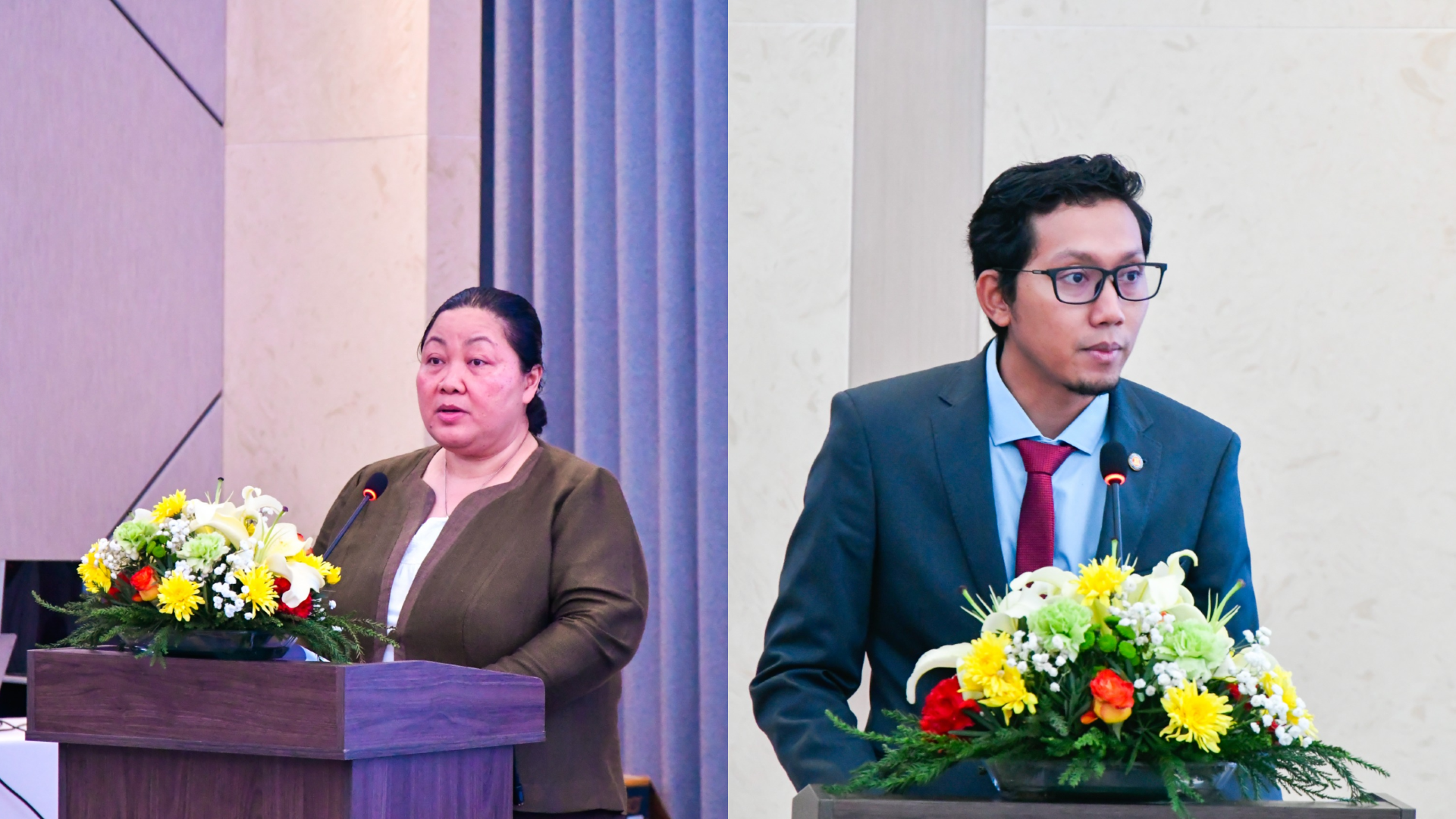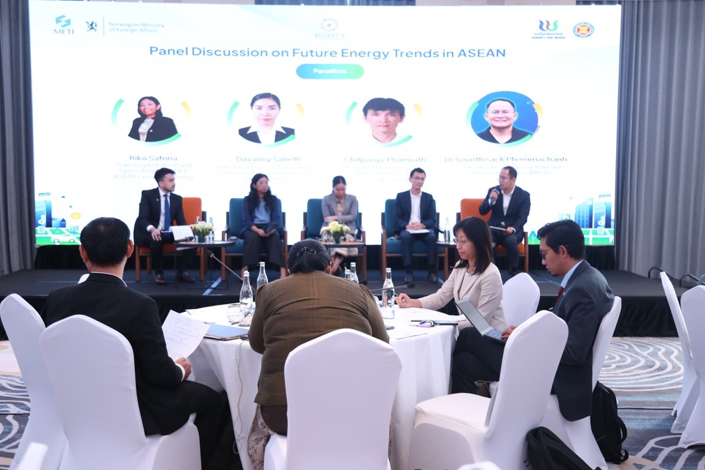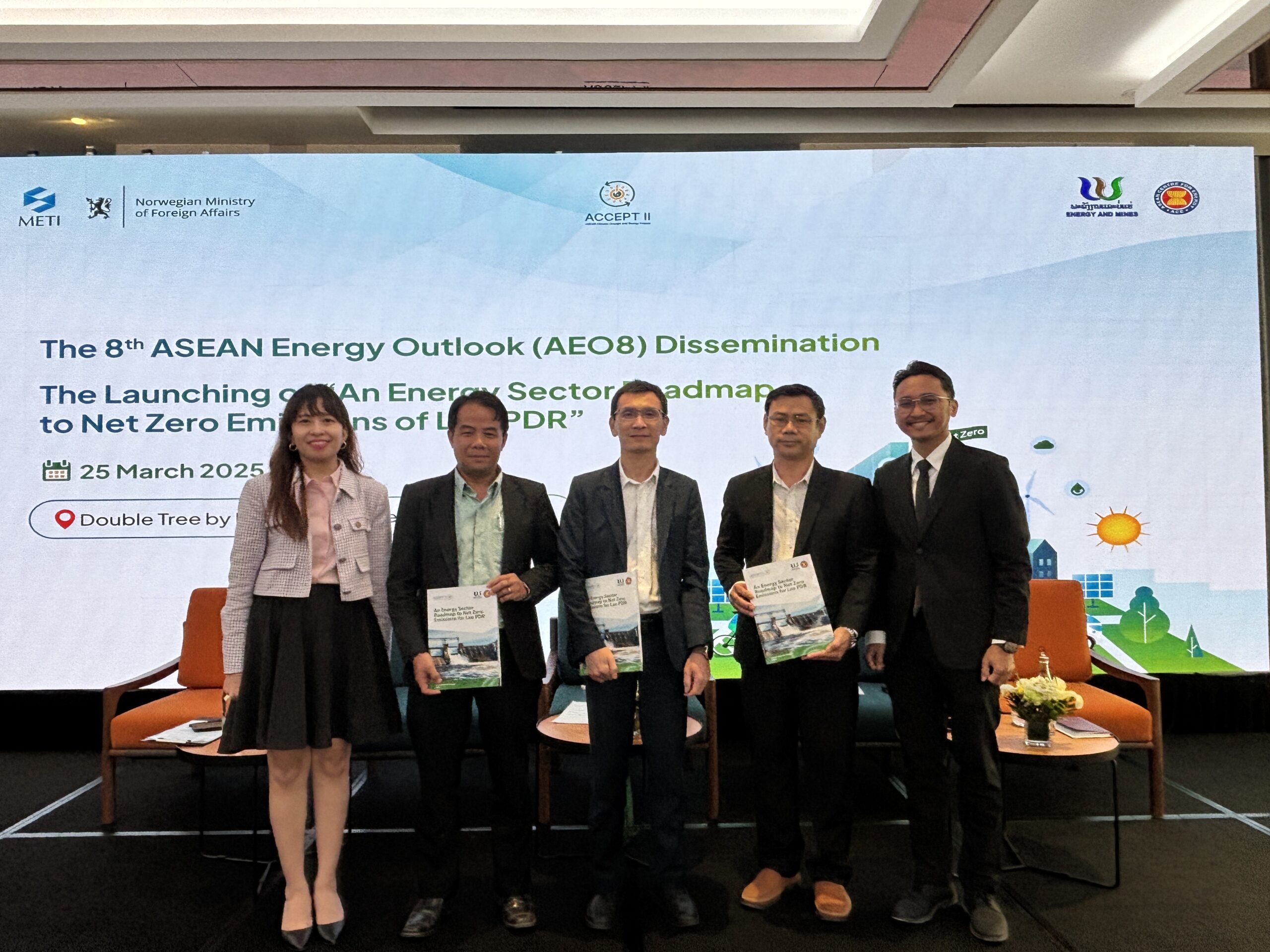Menu

Photo 1. Group photo of the 8th ASEAN Energy Outlook (AEO8) Dissemination and the Launching of “An Energy Sector Roadmap to Net Zero Emissions of Lao PDR”
The ASEAN Centre for Energy (ACE) through the ASEAN Climate Change and Energy Project (ACCEPT) Phase II held a back-to-back event for the 8th ASEAN Energy Outlook (AEO8) Dissemination and launching of the new report entitled “An Energy Sector Roadmap to Net Zero Emissions for Lao PDR” in DoubleTree by Hilton Hotel, Vientiane, Lao PDR, on 25 March 2025.
As the ASEAN region is undergoing rapid growth and rising energy demand, it is essential to meet its increasing energy needs while ensuring energy security, affordability, accessibility, and sustainability. To navigate this transition, the ASEAN Plan of Action for Energy Cooperation (APAEC) serves as a strategic framework, guiding regional energy policies and collaboration. As the current APAEC (2021-2025) nears its conclusion, the next phase (2026-2030) is currently being drafted and set to be launched this year to shape ASEAN’s energy future. A key tool in this process is the ASEAN Energy Outlook, a flagship publication of ACE, which provides data-driven insights into the region’s evolving energy landscape and future trends. Endorsed by the 42nd ASEAN Ministers on Energy Meeting in September 2024, the AEO8 analyses energy trends, challenges, and potential pathways for the region until 2050 by presenting four scenarios, providing critical insights to ensure a just energy transition in ASEAN.
While the AEO8 offers a broad regional perspective, each ASEAN Member States (AMS) faces unique energy challenges. Recognising this, the Centre, with the support of ACCEPT marked another milestone with the official launch of ‘An Energy Sector Roadmap to Net Zero Emissions of Lao PDR’, developed in collaboration with the Ministry of Energy and Mines (MEM) of Lao PDR.
Often referred to as the “Battery of Southeast Asia” due to its abundant hydropower resources, Lao PDR has long been a regional leader in clean energy exports. However, as climate patterns shift and the need for energy diversification grows, reliance on hydropower alone is no longer sufficient. Lao PDR’s abundant wind, solar, and biomass resources offer an opportunity to enhance energy security and sustainability while advancing low-carbon transition. Hence, this report explores potential national pathways to reduce emissions through a range of technological approaches, including renewable energy and emerging low-carbon technologies.

Photo 2. (Left to right) Opening Remarks by Dr Santisouk Phimphachanh, SOE Leader of Lao PDR and Director General at MEM of Lao PDR and Dr Zulfikar Yurnaidi, Manager of MPP Department at ACE.
The event was welcomed with opening remarks from Dr Santisouk Phimphachanh, Senior Official on Energy (SOE) Leader of Lao PDR and Director General at MEM of Lao PDR, and Dr Zulfikar Yurnaidi, Manager of Energy Modelling and Policy Planning (MPP) at ACE, highlighting the crucial role of the next phase of APAEC in guiding ASEAN’s energy transition and Lao PDR’s opportunities in decarbonisation efforts.
The event was then kickstarted with the scene-setting presentation of the findings from the AEO8 by Rika Safrina, Team Lead of AEO8 and Senior Analyst of MPP from ACE. This outlook, developed in close collaboration with ASEAN Member States, provides critical insights into the region’s evolving energy landscape and outlines various scenarios for future energy demand and supply, as well as socio-economic implications. As ASEAN faces a dramatic increase in energy consumption, projected to be 2.6 times by 2050 from the 2022 level, AEO8 offers valuable data-driven recommendations to navigate the challenges in achieving the national and regional energy targets.

Photo 3. Panel discussion on future energy trends in ASEAN featuring (from left to right) Muhammad Ilham Rizaldi, Research Analyst of ACE, Rika Safrina, Team Lead of AEO8, Davanny Saneth, Director of Division, Department of Energy Policy and Planning of MEM Lao PDR; Chitpanya Phamisith of Electricite du Laos (EDL); and Dr Sounthisack Phommachanh from the Faculty of Engineering of National Univesity of Laos (NUOL).
Following the first presentation, the Panel Discussion on Future Energy Trends in ASEAN commenced, moderated by Muhammad Ilham Rizaldi, Research Analyst of MPP & ACCEPT II from ACE. The panellists consisted of Rika Safrina; Davanny Saneth, Director of Division, Department of Energy Policy and Planning of MEM Lao PDR; Chitpanya Phamisith, Électricité du Laos (EDL); and Dr Sounthisack Phommachanh from the Faculty of Engineering, National University of Laos (NUOL). This discussion highlighted several key expectations for the next APAEC cycle. Panellists emphasised the need for inclusive policies that prioritise the environmental impacts of the energy sector, ensuring that social equity is at the forefront of energy transitions. A significant focus was placed on advancing energy technology, particularly in harnessing Lao PDR’s abundant resources to secure green energy solutions. Additionally, the panel highlighted the need to address national challenges and opportunities, prioritise data-driven policies, and enhance collaboration with academia to drive innovation.

Photo 4. (Left to right) Dr Zulfikar Yurnaidi, Manager of MPP Department at ACE, Aldilla Noor Rakhiemah, Project Manager of ACCEPT, and Dr Santisouk Phimphachanh, SOE Leader of Lao PDR during the Lao Net Zero Roadmap launching.
The discussion was followed by the launching presentation of “An Energy Sector Roadmap to Net Zero Emissions for Lao PDR” by Muhammad Rizki Kresnawan, Senior Energy Modeller of MPP & Senior Research Analyst of ACCEPT II at ACE. He highlighted Lao PDR’s economic context, energy needs, and climate commitment. With the growing needs of the country’s energy supply, he emphasised the need to bridge the energy transition and the country’s net zero ambition. However, some cross-cutting issues in achieving Lao Net Zero by 2050 existed, such as Lao’s economic challenges, energy market complexities, power trade, the double-edged sword of Lao hydropower, and regional cooperation. With the existing challenges and opportunities, he highlighted some policy recommendations to achieve the net zero goal while fulfilling the country’s energy demands.

Photo 5. (From left to right) Aldilla Noor Rakhiemah, Project Manager of ACCEPT II; Boualom Saysanavong, Director of Biomass Energy Promotion Divison, Department of Energy Efficiency and Promotion, MEM of Lao PDR; Chitpanya Phamisith, Manager of Power System Planning, EDL; Dr Phoummixay Siharath from the Department of Environmental Engineering, NUOL, and Muhammad Rizki Kresnawan, Senior Research Analyst of ACE.
Following this presentation, the Panel Discussion on Lao Net Zero Roadmap took place, moderated by Aldilla Noor Rakhiemah, Project Manager of ACCEPT II & Senior Research Analyst of MPP Department at ACE, and the panellists, which consisted of Muhammad Rizki Kresnawan; Boualom Saysanavong, Director of Biomass Energy Promotion Division, Department of Energy Efficiency and Promotion, MEM of Lao PDR; Chitpanya Phamisith, Manager of Power System Planning, Électricité du Laos (EDL); and Dr Phoummixay Siharath from the Department of Environmental Engineering, NUOL.
The next APAEC is set under a new theme: ‘Advancing Regional Cooperation in Ensuring Energy Security and Accelerating Decarbonisation for a Just and Inclusive Energy Transition’. Moving forward, accelerating ASEAN’s energy transition requires not only overcoming technological and financial barriers but also prioritising people-centred policies that prioritise social equity at the heart of energy transitions and ensuring inclusive and fair access to clean energy solutions. By aligning energy strategies with community needs and environmental sustainability, ASEAN can pave the way for a more resilient and balanced energy future.
The significance of the event and its key messages attracted attention from Lao local media, which widely covered the proceedings through various platforms:
This event was supported by the Ministry of Economy, Trade and Industry (METI) Japan and ACCEPT II. Through ACCEPT, ACE assists the ASEAN Member States by implementing one of APAEC’s key outcome-based strategies to promote information sharing on the energy-climate nexus, providing capacity-building programmes and disseminating critical knowledge on energy and climate issues to policymakers.
